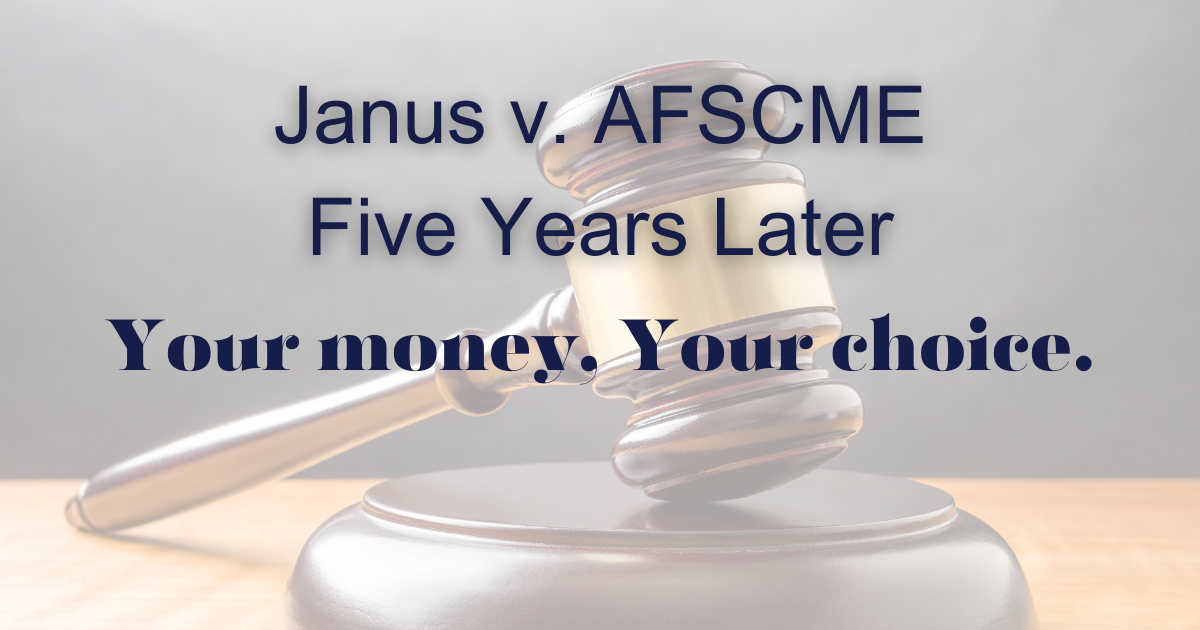 Five years ago, on a landmark day for individual rights, the U.S. Supreme Court issued its decision in Janus v. AFSCME, ruling it unconstitutional for public sector labor unions to force non-members to pay dues or fees as a condition of employment. Thanks to a court case brought on behalf of plaintiff Mark Janus, public employees are no longer required to pay union dues and support speech they do not agree with. Janus v. AFSCME stands today as a testament to the power of empowering workers to make their own choices with their own money.
Five years ago, on a landmark day for individual rights, the U.S. Supreme Court issued its decision in Janus v. AFSCME, ruling it unconstitutional for public sector labor unions to force non-members to pay dues or fees as a condition of employment. Thanks to a court case brought on behalf of plaintiff Mark Janus, public employees are no longer required to pay union dues and support speech they do not agree with. Janus v. AFSCME stands today as a testament to the power of empowering workers to make their own choices with their own money.
In 2015, Mark Janus, a child support specialist employed by the state of Illinois, challenged the mandatory fees imposed by the American Federation of State, County, and Municipal Employees (AFSCME). Before the 2018 Janus decision, public employees in states without right-to-work laws (including Illinois and Alaska) had two options: be a member and pay full union dues or decline membership and pay mandatory “agency fees” (which were often scarcely less than full membership dues, thus negating any incentive for employees to opt out of membership). Mr. Janus was not a member of the union but was forced to pay agency fees as a condition of his employment with the state of Illinois.
The case centered around the question of whether mandatory union fees violated the First Amendment rights of non-union public employees by forcing them to subsidize speech with which they might disagree. The Court’s decision, handed down on June 27, 2018, ruled that mandatory union fees in the public sector were unconstitutional, as they infringed upon the free speech rights of non-union employees. The court affirmed that workers should not be compelled to support or fund causes with which they do not agree.
Since the Janus decision, there have been notable declines in public sector union membership as workers have exercised their newfound freedom to opt out of union representation. Data compiled by the Mackinac Center suggests that reported membership in 66 public sector unions in the 22 non-right-to-work states decreased by “379,315 dues and fee payers, or 11.3%.” The National Education Association reported a 7.6% decline in working members between 2017 and 2022; the American Federation of Teachers reported a decline of 9.5%. AFSCME’s membership reached its lowest on record following the Janus decision.
Some non-right-to-work states reported much steeper declines than federal data suggests. Through public records requests, the Mackinac Center calculated that in Alaska in 2022, 35.5% of public employees covered by collective bargaining agreements chose not to be a member of their union. Unions now must persuade potential members of the value they provide, rather than forcing all public employees to pay dues; clearly, many employees would rather keep their money.
However, there is still a long way to go in fully implementing the Janus decision. Employees are often still unaware of their Janus rights and how to exercise them, and unions are not always eager to volunteer that information. Some unions, including some in Alaska, have imposed short, restrictive windows on the timeframe in which an employee may opt out of union membership. The ability to opt out of union membership is a crucial component of public employees’ First Amendment rights and no government worker should have to pay money to a union against their will.
The fifth anniversary of Janus vs. AFSCME is an opportunity to reflect on a rare triumph of individual choice and freedom in the realm of labor rights. The decision has reshaped the landscape of public sector unions, empowering workers to exercise their rights and make their own decisions regarding what speech they support.
